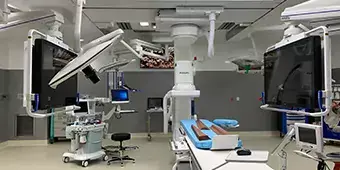The Benefits of Transcarotid Artery Revascularization (TCAR)

Transcarotid Artery Revascularization or TCAR is a safe and effective way for patients with buildup in the carotid artery to be treated in a minimally invasive way. It is approved for use for patients who are considered at high risk of stroke, high risk for surgery, or high risk due to age and other medical conditions.
For those who are risk for a stroke due to plaque buildup, specifically in the arteries or for those who have already had a stroke and similar event, TCAR can be a successful way to replenish the blood flow to your brain and prevent a future stroke.
Benefits include:
- Smaller incisions
- Less recovery time
- Shorter hospital stays
- Lower risk of nerve injuries
“TCAR is an innovative procedure that allows surgeons to provide better patient care. During a TCAR, we do not need to navigate catheters through the aortic arch, which can lead to stroke,” said Sean Ryan, MD, of Beebe Vascular. “In addition, any fragments of plaque released during the procedure are safely filtered out. Offering this new minimally invasive option for our patients will dramatically reduce the risk of stroke and heart attack during and after carotid interventions.”
How Safe is TCAR?
Over 10,000 TCAR procedures have been performed worldwide through clinical trial and commercial use. TCAR has been studied extensively, and the clinical data have been excellent. In fact, the data are so compelling that the Society of Vascular Surgeons, Centers for Medicare and Medicaid Services (CMS), and the U.S. Food and Drug Administration (FDA) came together in September 2016 to create a program to support its reimbursement.
To learn more or to schedule: Call 302-644-4954.
Request more information: https://www.beebehealthcare.org/form/request-tcar-information
Caption: TCAR procedures are performed in the new hybrid operating room at the Margaret H. Rollins Lewes Campus.



